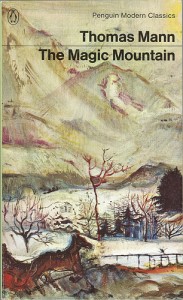 I was a teenager—that is to say, pretty much an unsophisticated jerk—when I first read The Magic Mountain almost 50 years ago, in an undergraduate class taught by the iconoclastic theater director Herbert Blau. He had blasted us through two volumes of Proust’s Remembrance of Things Past in as many weeks, and now allowed us a week for Mann’s 720-page juggernaut. While Proust only lightly stuck, Mann’s majestic prose sucked me in like a downhill skier into a sudden blizzard.
I was a teenager—that is to say, pretty much an unsophisticated jerk—when I first read The Magic Mountain almost 50 years ago, in an undergraduate class taught by the iconoclastic theater director Herbert Blau. He had blasted us through two volumes of Proust’s Remembrance of Things Past in as many weeks, and now allowed us a week for Mann’s 720-page juggernaut. While Proust only lightly stuck, Mann’s majestic prose sucked me in like a downhill skier into a sudden blizzard.
The plot sounds deceptively simple. A young man named Hans Castorp goes up a mountain to visit a friend suffering from tuberculosis. There he is diagnosed with the same disease and winds up spending seven years in the same sanatorium. Gradually, he is drawn into the society of the sufferers, wonderfully drawn personalities, all of them: the ever-optimistic humanist Settembrini, the hunchbacked authoritarian Naphta, the erotically charged Madame Chauchat, the scientific Dr. Behrens, the loquacious Mynheer Peperkorn, a Dutch planter who emanates a charismatic cheeriness that causes people to hang on his every, half-coherent utterance. In short, the sanatorium’s inmates comprise a microcosm of Europe on the eve of the First World War, through which the impressionable young Castorp passes like Candide.
The Magic Mountain, published in 1924, is not a historical novel but a novel about history—about a time just past whose ramifications have yet to fully unfold. Mann chillingly foresaw the disintegrating faith in reason and the corresponding surrender to the irrational that only a few years later produced Adolf Hitler and caused Mann’s own books to be burned in Germany.
The Magic Mountain taught me that big ideas have vitality, that intellectual life could make for great storytelling, and that the map of an age could be found in the personalities of the people who lived it, lessons that I carried into the writing of history. But the truth is, I have returned again and again to The Magic Mountain because the characters who inhabit it are such delightful company. Hans Castorp finally, reluctantly, descended the mountain to disappear into the maelstrom of the First World War. Like him, I hate to come back down. Unlike him, however, I have the privilege of returning.

